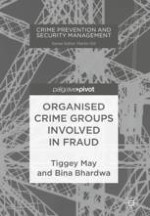2018 | OriginalPaper | Chapter
5. Cops and Twenty-First-Century Robbers
Authors : Tiggey May, Bina Bhardwa
Published in: Organised Crime Groups involved in Fraud
Publisher: Springer International Publishing
Activate our intelligent search to find suitable subject content or patents.
Select sections of text to find matching patents with Artificial Intelligence. powered by
Select sections of text to find additional relevant content using AI-assisted search. powered by
